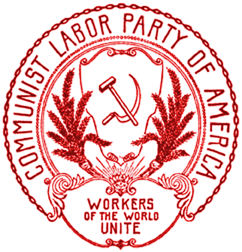

This article is part of the series: Politics and government of Russia
The Communist Party of the Russian Federation (Russian: Коммунистическая партия Российской Федерации = КПРФ; translit.: Kommunisticheskaya Partiya Rossiskoy Federatsii — KPRF) is a Russian political party. It is sometimes seen as a successor to the Communist Party of the Soviet Union (CPSU) and the Bolshevik Party. The party has emphasised its uniquely Russian character and it has consistently invoked Russian patriotism and nationalism in addition to the official Marxism-Leninism of the CPSU. The party claims membership of 184,000 (2006).
Constitution
President: Vladimir Putin
- Presidential Administration
Security Council
Government
- Prime Minister: Mikhail Fradkov
Cabinet
Federal Assembly
- Federation Council
State Duma
Judiciary (Russian Constitution)
- Constitutional Court
Supreme Court
Supreme Court of Arbitration
Public Chamber
State Council
Law system
Political parties Elections in Russia
- President: 2000 - 2004 - 2008
Parliamentary: 2003 - 2007
Central Election Commission
Subdivisions
Federal subjects
Human rights
Foreign relations Elections
In parliament, after an initial slow start with just 11% in the first 1993 parliamentary elections, it grew to a massive 35% in the 1995 parliamentary elections, making it by far the biggest Russian party, but then gradually declined, first to 24% in the 1999 elections and then 13% in the 2003 parliamentary elections, resulting in 51 out of 450 seats. The next elections will be on 2 December 2007.
In all presidential elections since the fall of the Soviet Union, the Communist candidate came second. In the 1991 elections, candidate Nikolai Ryzhkov won 17% of the votes, and was beaten by Boris Yeltsin. In the 1996 elections, candidate Gennady Zyuganov rose to 32% of the votes, just short of Yeltsin's 35%. In the 2000 elections, Zyuganov was the communist candidate, and dropped slightly to 29%, but Vladimir Putin won a landslide victory with 53%. In the last presidential elections, 14 March 2004, Putin's support rose to 71% and the Communist Party's candidate, Nikolay Kharitonov, won only 14%. Taking into consideration the fact that Kharitonov (a leading member of the Agrarian Party of Russia) was considered to be a "token" candidate, this was a better result than expected, showing that the CPRF still has a substantial base of support. The next elections are scheduled to be held on 9 March 2008.
In February 2005 the CPRF managed to beat the ruling Pro-Kremlin party, United Russia, in elections to the regional legislature of Nenets Autonomous Okrug, obtaining 27% of the popular vote.
In the last Moscow Duma election, 4 December 2005, the Party won 16,75 % and 4 seats. This was the best ever result for the CPRF in Moscow. In some observers opinion, the absence of the Rodina party contributed to the Communists' success.
On March 11, 2007, elections took place for 14 regional and local legislatures. The CPRF performed very well and increased its votes in most of the territories; it came second in Oryol Oblast (23,78%), Omsk Oblast (22,58%), Pskov Oblast (19,21%) and Samara Oblast (18,87%), Moscow Oblast (18,8%), Murmansk Oblast (17,51%) and Tomsk Oblast (13,37%), . These results testify that the CPRF is the most significant opposition party in Russia.
On May 21, 2007, the CPRF obtained an important success in the Volgograd's mayoral election. Communist candidate Roman Grebennikov was elected as mayor with 32,47% of the vote. Grebennikov is the youngest mayor of a regional capital.
Party leaders
The CPRF is led by Gennady Zyuganov. Early external collaborators included Eurasianist philosopher Aleksandr Dugin who helped to draft early party documents and pushed the party in the direction of nationalism. During the presidential elections of 1996, the CPRF was supported by prominent intellectual Aleksandr Zinovyev (a former Soviet dissident who became a supporter of Communism at the time of Perestroika). Another prominent supporter of the CPRF is the physicist Zhores Alferov, who received the Nobel Prize for Physics in 2000.
A new leftist umbrella movement was formed on the initiative of the CPRF on August 7, 1996. It was called People's Patriotic Union of Russia (NPSR) and consisted of more than 30 leftist and "patriotic" organizations. Gennady Zyuganov was its chairman. He was supported by the party as a candidate for Russia's presidency during the 1996 Presidential elections and 2000 Presidential elections.
Zyuganov called the 2003 elections a 'revolting spectacle' and accuses the Kremlin of setting up a Potemkin party, the Rodina party, to steal its votes.
A minority faction criticised the decision to candidate "millionaires" (such as Sergei Sobko, general director and owner of the TEKHOS company) in the CPRF's lists, which was seen as a contradiction to the Marxist-Leninist and anti-oligarchic policies of the Party.
In July 2004 a breakaway faction elected Vladimir Tikhonov as its leader. The faction later formed the All-Russia Communist Party of the Future. The operation wasn't successful and recently Tikhonov's party has suspended active operations, seeking rapprochement with Zyuganov's side.
- President: 2000 - 2004 - 2008
- Constitutional Court
- Federation Council
- Prime Minister: Mikhail Fradkov
No comments:
Post a Comment